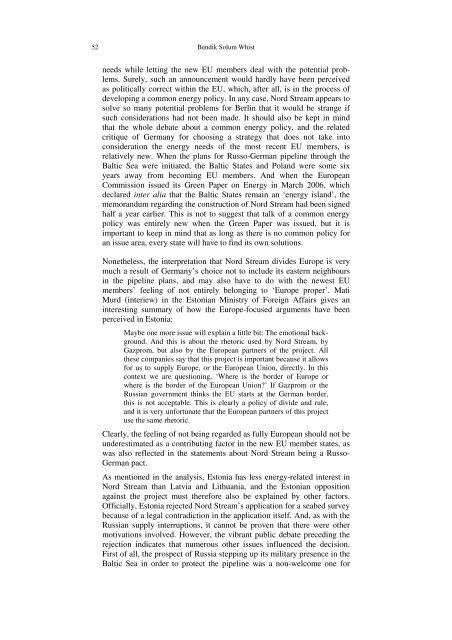Nord Stream: Not Just a Pipeline
Nord Stream: Not Just a Pipeline
Nord Stream: Not Just a Pipeline
You also want an ePaper? Increase the reach of your titles
YUMPU automatically turns print PDFs into web optimized ePapers that Google loves.
52 Bendik Solum Whist<br />
needs while letting the new EU members deal with the potential problems.<br />
Surely, such an announcement would hardly have been perceived<br />
as politically correct within the EU, which, after all, is in the process of<br />
developing a common energy policy. In any case, <strong>Nord</strong> <strong>Stream</strong> appears to<br />
solve so many potential problems for Berlin that it would be strange if<br />
such considerations had not been made. It should also be kept in mind<br />
that the whole debate about a common energy policy, and the related<br />
critique of Germany for choosing a strategy that does not take into<br />
consideration the energy needs of the most recent EU members, is<br />
relatively new. When the plans for Russo-German pipeline through the<br />
Baltic Sea were initiated, the Baltic States and Poland were some six<br />
years away from becoming EU members. And when the European<br />
Commission issued its Green Paper on Energy in March 2006, which<br />
declared inter alia that the Baltic States remain an ‘energy island’, the<br />
memorandum regarding the construction of <strong>Nord</strong> <strong>Stream</strong> had been signed<br />
half a year earlier. This is not to suggest that talk of a common energy<br />
policy was entirely new when the Green Paper was issued, but it is<br />
important to keep in mind that as long as there is no common policy for<br />
an issue area, every state will have to find its own solutions.<br />
Nonetheless, the interpretation that <strong>Nord</strong> <strong>Stream</strong> divides Europe is very<br />
much a result of Germany’s choice not to include its eastern neighbours<br />
in the pipeline plans, and may also have to do with the newest EU<br />
members’ feeling of not entirely belonging to ‘Europe proper’. Mati<br />
Murd (interiew) in the Estonian Ministry of Foreign Affairs gives an<br />
interesting summary of how the Europe-focused arguments have been<br />
perceived in Estonia:<br />
Maybe one more issue will explain a little bit: The emotional background.<br />
And this is about the rhetoric used by <strong>Nord</strong> <strong>Stream</strong>, by<br />
Gazprom, but also by the European partners of the project. All<br />
these companies say that this project is important because it allows<br />
for us to supply Europe, or the European Union, directly. In this<br />
context we are questioning, ‘Where is the border of Europe or<br />
where is the border of the European Union?’ If Gazprom or the<br />
Russian government thinks the EU starts at the German border,<br />
this is not acceptable. This is clearly a policy of divide and rule,<br />
and it is very unfortunate that the European partners of this project<br />
use the same rhetoric.<br />
Clearly, the feeling of not being regarded as fully European should not be<br />
underestimated as a contributing factor in the new EU member states, as<br />
was also reflected in the statements about <strong>Nord</strong> <strong>Stream</strong> being a Russo-<br />
German pact.<br />
As mentioned in the analysis, Estonia has less energy-related interest in<br />
<strong>Nord</strong> <strong>Stream</strong> than Latvia and Lithuania, and the Estonian opposition<br />
against the project must therefore also be explained by other factors.<br />
Officially, Estonia rejected <strong>Nord</strong> <strong>Stream</strong>’s application for a seabed survey<br />
because of a legal contradiction in the application itself. And, as with the<br />
Russian supply interruptions, it cannot be proven that there were other<br />
motivations involved. However, the vibrant public debate preceding the<br />
rejection indicates that numerous other issues influenced the decision.<br />
First of all, the prospect of Russia stepping up its military presence in the<br />
Baltic Sea in order to protect the pipeline was a non-welcome one for













